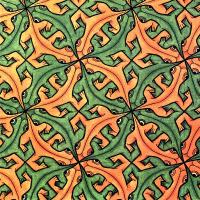Pesan: 15
Bahasa: English
jkph00 (Tunjukkan profil) 7 November 2013 23.24.12
Antaǔan dankon!
Olsho (Tunjukkan profil) 8 November 2013 01.21.52
jkph00:"Leaves of red, gold and brown swirled around us?"Saluton jkph00!
Mi ne estas spertulo, sed „de“ por mi ne bone sonas. Mi proponas uzi „en“ (Folioj en ruĝo, oro kaj bruno – aŭ: Folioj en ruĝ’, or’ kaj brun’).
Aŭ alia versio: „Folioj ruĝaj, oraj kaj brunaj.“ – Sonas iomete pli poezia, kvankam la ritmo ne plu estas – se estus en la origina verko.
Amike
Olsho
Evildela (Tunjukkan profil) 8 November 2013 02.14.36
jkph00:How would I express the sentence, "Leaves of red, gold and brown swirled around us?" Would "Folioj de ruĝo, oro kaj bruno kirliĝis ĉirkaŭ ni" do it? Or would one have to say something like, "Ruĝaj, oraj kaj brunaj folioj kirliĝis ĉirkaǔ ni?"I would simply say: ruĝaj oraj kaj brunaj floroj ĉirkaŭnaĝas nin
Antaǔan dankon!
Nile (Tunjukkan profil) 8 November 2013 02.16.16
I don't recognize your usage of "of", but I imagine that "de" would be as self-evident to an Esperantist as "of" was to me.
jismith1989 (Tunjukkan profil) 8 November 2013 09.59.36
Nile:I think that just using "de" should be fine.I agree. Other languages use the genitive (i.e. the equivalent of de) for that purpose. En would work too though I suppose.
I don't recognize your usage of "of", but I imagine that "de" would be as self-evident to an Esperantist as "of" was to me.
The only other thing is that the colors would have to be in nominal form (i.e. as nouns) rather than adjectival, but jkph00 did that.
tommjames (Tunjukkan profil) 8 November 2013 10.50.10
sudanglo (Tunjukkan profil) 8 November 2013 14.10.05
However, you could argue that folioj de ruĝo ... emphasizes the colour over form, whilst foliaj ruĝaj ... gives more prominence to the leaves with the colour being more incidental.
'swirled around us' - ĉu cirkaŭkuris nin aŭ ĉirkaŭ ni kirliĝis?
jkph00 (Tunjukkan profil) 8 November 2013 22.02.26
Evildela: I would simply say: ruĝaj oraj kaj brunaj floroj ĉirkaŭnaĝas nin"Red, gold and brown leaves float around us." That's a beautiful image, too, though softer in motion than I meant. Tell me, why do you not put a comma after ruĝaj, and/or oraj? And when you use the compound word ĉirkaǔnaĝas with accusative nin rather than using the preposition and object pronoun ĉirkaǔ ni, does Esperanto favor accusative over prepositions in style? Or is it personal preference?
Thanks!
jkph00 (Tunjukkan profil) 8 November 2013 22.19.28
sudanglo:This is just a matter of the poetic versus the prosaic.I tried in fact to stress the colors rather than the leaves so much, so it seems I got that right. The colors were brilliant!
However, you could argue that folioj de ruĝo ... emphasizes the colour over form, whilst foliaj ruĝaj ... gives more prominence to the leaves with the colour being more incidental.
sudanglo:'swirled around us' - ĉu cirkaŭkuris nin aŭ ĉirkaŭ ni kirliĝis?Evildela also used suggested an expression prefixing the ĉirkaǔ to the verb. I like the image of the leaves "running around about us," too. Is it preferred to affix the adverb when possible, or a question of personal preference?
As I have mentioned before, I really like your writing style, so tell me, why do you prefer the conjugated verb form kirliĝis after the prepositional phrase ĉirkaǔ ni rather than before as I had put it originally?
Dankon!
jkph00 (Tunjukkan profil) 8 November 2013 22.33.13
Olsho:All are beautiful possibilities, Olsho, thank you! Speaking some German myself, I can easily see why en would be a preference for you over de. I will let it trip a while on the tongue of my mind to see which sounds and tastes most poetic to me. Danke!jkph00:"Leaves of red, gold and brown swirled around us?"Saluton jkph00!
Mi ne estas spertulo, sed „de“ por mi ne bone sonas. Mi proponas uzi „en“ (Folioj en ruĝo, oro kaj bruno – aŭ: Folioj en ruĝ’, or’ kaj brun’).
Aŭ alia versio: „Folioj ruĝaj, oraj kaj brunaj.“ – Sonas iomete pli poezia, kvankam la ritmo ne plu estas – se estus en la origina verko.
Amike
Olsho







